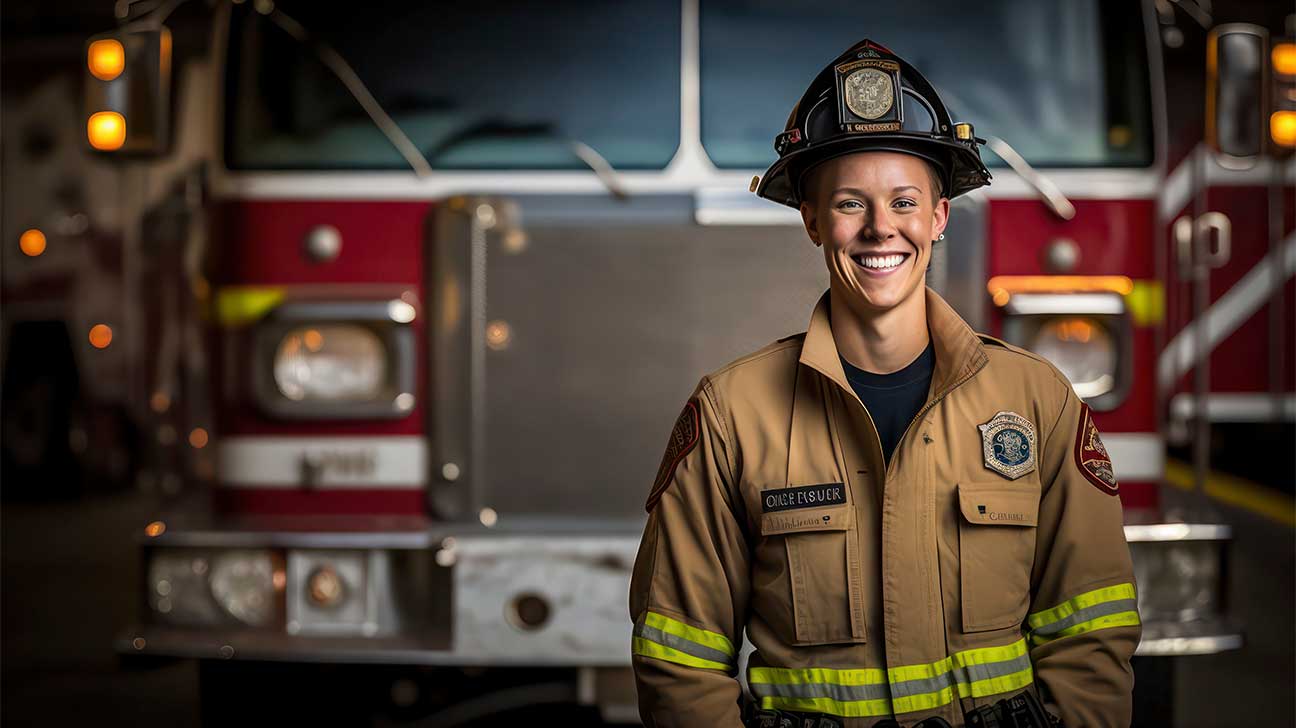
First responders report to emergencies and non-emergencies. These police officers, firefighters, and emergency medical services (EMS) personnel help maintain the health and safety of our communities.
For the 4.6 million Americans working as first responders, the job is far from easy. While some calls are minor, others involve chaotic, dangerous, and even life-threatening situations.
Trauma can result from these experiences and significantly affect mental health and well-being. People who experience trauma or chronic stress may turn to substance use as a coping mechanism.
Substance Abuse Rates Among Emergency Responders
About 80% of first responders face traumatic experiences on the job. The emotional toll of trauma puts these professionals at risk for substance use disorder (SUD) and other mental health disorders.
Emergency medical technicians (EMTs) have the highest rate of substance abuse among emergency responders, at 40%. Between 80% and 100% of EMTs are exposed to on-the-job trauma.
About 25% of law enforcement officers and 30% of firefighters have substance abuse issues. These numbers are nearly three and four times the rate of the general population (8.4%), respectively.
The rate of alcohol abuse among all first responders ranges from 16% to 40%. On average, about one in three first responders abuse alcohol.
Opioid painkillers and benzodiazepines are the most abused prescription drugs among first responders, though the exact figure is unknown.
| Type Of Drug Use | Rate Of Addiction | Trend |
|---|---|---|
| Alcohol Use | 16% to 40% | Consistent |
| Illicit Drug Use | N/A | Marijuana is the most abused illicit drug |
| Prescription Drug Abuse | N/A | Opioids and benzodiazepines are the most abused prescription drugs |
Signs Of Addiction Among First Responders
If a first responder is dealing with a substance use problem, there are likely telltale physical and emotional signs that coworkers and family members may notice.
Common signs of substance abuse include:
- bloodshot or glossy eyes
- eyes with pupils that are over-sized or pinhole-sized
- unpredictable and/or extreme mood swings
- slurred speech
- impulsive behavior
- tremors or shakiness
- sudden weight loss or gain
- reduced concern for personal hygiene and/or appearance
Other signs of substance abuse may relate directly to a person’s ability to correctly perform their job.
Common signs of substance abuse among first responders include:
- decreased performance and productivity
- poor memory
- neglecting responsibilities
- trouble focusing
- avoiding contact with supervisors
- increased absenteeism
- increased incidence of job error or accidents
Possible Contributing Factors To Substance Use Among Emergency Responders
First responders must expect the unexpected on a daily basis. From traumatic injuries and car accidents to drug overdoses and house fires, there’s no telling what might happen during any given shift.
While emergency responders have the chance to make a major difference in people’s lives, including saving lives, they also are vulnerable to experiences that can affect their psychological health.
Chronic Traumatic Stress
Traumatic stress is a major concern among this cohort. Trauma occurs when a person witnesses or experiences overwhelming violence or danger, which then affects their ability to cope.
Chronic traumatic stress occurs when these experiences are observed or witnessed repeatedly. Since first responders often report to scenes of death and disaster, it’s a regular part of the job.
Examples of scenarios that can cause traumatic stress include:
- psychological, physical, or sexual abuse
- natural disasters
- community violence
- school violence
- terrorism
- domestic violence
- roadway incidents
Traumatic stress and especially chronic traumatic stress can cause post-traumatic stress disorder (PTSD).
PTSD is a disorder that’s characterized by difficulty overcoming the feelings from observing or experiencing a frightening event. About one in three first responders have PTSD.
Chronic stress, trauma, and PTSD are all considered risk factors for drug and alcohol addiction, because they may cause people to self-medicate with these substances.
Sleep Deprivation
Though some first responders are scheduled to work eight-hour shifts, this isn’t always the case. EMTs, for example, may commonly work nine-, 12-, or even 24-hour shifts.
Many first responders work on rotating schedules and frequently switch between day and night shifts. This rotation can throw off their natural sleep cycle and cause sleeping problems.
Regardless of work schedule, disaster can strike at any time. First responders may be required to work overtime to answer calls promptly and accommodate all persons in need.
Sleep deprivation can have serious effects beyond fatigue. It can affect judgment, slow reaction time, and even endanger the health and safety of the first responder and the people they serve.
To deal with this stress, emergency responders may turn to substance use. Or they may use stimulants in order to stay awake or other drugs to help them sleep.
Mental Health Effects
Mental health effects due to the nature of their job are also common among first responders, who are five times more likely to suffer from depression and PTSD than the average person.
First responders also suffer high rates of suicide. Between 2015 and 2017, 1% of all suicides were committed by first responders: 58% were police officers, 21% were firefighters, and 18% were EMTs.
Risks Associated With Addiction Among First Responders
First responders are responsible for ensuring the health and well-being of people and their communities. Being under the influence can compromise their ability to do so.
Impairment due to substance use can cause first responders to make illogical or impulsive decisions. In high-risk situations, these decisions can mean the difference between life and death.
Supporting First Responders Facing Addiction
First responders provide specialized services to the community. Fortunately, specialized addiction treatment programs are available for these professionals.
Addiction Treatment Centers For Emergency Responders
There are treatment centers nationwide that cater specifically to first responders’ recovery needs. This may include addressing co-occurring disorders and offering trauma-informed care.
First responders may not reach out for help for fear of stigma and job repercussions. These treatment centers assure them full confidentiality to ensure the focus remains on recovery.
Outpatient treatment allows first responders to work while receiving treatment, which typically focuses on cognitive behavioral therapy (CBT), group therapy, peer support, and medical services.
Inpatient treatment, where clients stay onsite at the rehab center, offers more structure and 24/7 care for people with more severe SUDs or those who need a drug-free environment.
Support From Leadership
Addiction can happen to anyone. Leadership can help support their first responders by supplying them with the information they need to ensure their mental and physical well-being.
It is important for police departments, firehouses, hospitals, and healthcare facilities to provide first responders with information about substance abuse treatment services.
Leadership can also help prevent mental health issues from developing by providing first responders with access to treatment providers able to help them deal with traumatic events.
Find Substance Abuse Treatment Today
Overcoming addiction can feel daunting, but help is available. If you or a loved one has a substance use disorder, contact Detox Rehabs today to find treatment options.
Article Sources- Advances In Addiction And Recovery – Substance Use Disorders in First Responders
https://www.naadac.org/assets/2416/aa&r_winter2020_substance_use_disorders_in_first_responders.pdf - Institutes Of Health – PTSD In First Responders
https://institutesofhealth.org/ptsd-in-first-responders/ - Journal Of Safety Research – An Analysis Of Suicides Among First Responders ─ Findings From The National Violent Death Reporting System, 2015–2017
https://www.sciencedirect.com/science/article/abs/pii/S0022437523000415 - Substance Abuse And Mental Health Services Administration (SAMHSA) – Disaster Technical Assistance Center Supplemental Research Bulletin – First Responders: Behavioral Health Concerns, Emergency Response, and Trauma
https://www.samhsa.gov/sites/default/files/dtac/supplementalresearchbulletin-firstresponders-may2018.pdf - Substance Abuse And Mental Health Services Administration (SAMHSA) – First Responders And Disaster Responders Resource Portal
https://www.samhsa.gov/dtac/disaster-responders


